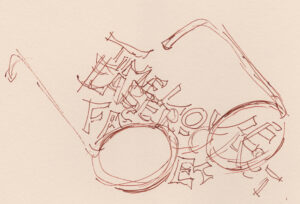 Have you ever written poetry? Not to produce a poem as professional poets do or with the aim of creating something to be admired, but just for the fun of playing with words, being friendly with them? Sestinas are a poetic form, where 6 words are used over and over again in 7 stanzas, no rhyming. (A good example is Elizabeth Bishop’s poem entitled Sestina, which was my first introduction to the form in the book, The Redress of Poetry by Seamus Heaney.) In a college class I taught, students were asked to write sestinas to explore who they were and picked words that resonated with them or meant something to them. The repetition took them beyond the superficial as they continued with repetition to put the words in different contexts, with a final stanza pulling all together. Although skeptical to start with, most of them quite appreciated the process in the end, and many also enjoyed the opportunity to share their final poem with others if they wanted to.
Have you ever written poetry? Not to produce a poem as professional poets do or with the aim of creating something to be admired, but just for the fun of playing with words, being friendly with them? Sestinas are a poetic form, where 6 words are used over and over again in 7 stanzas, no rhyming. (A good example is Elizabeth Bishop’s poem entitled Sestina, which was my first introduction to the form in the book, The Redress of Poetry by Seamus Heaney.) In a college class I taught, students were asked to write sestinas to explore who they were and picked words that resonated with them or meant something to them. The repetition took them beyond the superficial as they continued with repetition to put the words in different contexts, with a final stanza pulling all together. Although skeptical to start with, most of them quite appreciated the process in the end, and many also enjoyed the opportunity to share their final poem with others if they wanted to.
I am currently writing sestinas myself as a daily exercise. I pick my 6 words, sometimes the day before, and then in my morning contemplative time I write one. These are not intended to be great poems, or read by anyone other than me, but the stretching into the words, the playing with them, the exploration – this feels good. I dig into my desires and emotions that are under the surface, unarticulated. I sometimes pick words from my journal from the day before, or take a theme of interest to me, and pick words related to that.
Structure helps. I follow the requirement of having the 6 words at the end of each line in the first 6 stanzas, in a set order, and then pull all together in the last 3-line stanza using all 6 words, which feels very satisfying. You may want to try this. The rules seem complicated at first, but once you get the hang of it, it really is simple to follow as you go from one set to another as in a square dance, picking up the last word in the last line, and making that occur at the end of the first line in the next stanza.
We so often think of poetry in terms of the end result, the poem itself to be read and hopefully appreciated. But this exercise of writing these sestinas has no such aim. My aim is to become friendly with words again, and to dig into my thoughts and feelings that are bubbling under the surface, and give them air.
